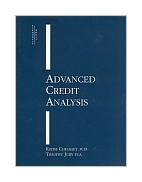|
||
• wydawnictwa polskie
• Zamów informacje o nowościach z wybranego tematu • kontakt
• Cookies na stronie |
ADVANCED CREDIT ANALYSISCHECKLEY K.wydawnictwo: EUROMONEY , rok wydania 2001, wydanie Icena netto: This book will ensure you can undertake a structured, detailed and rigorous review of both internal and external risk factors and determine future cash flows from which repayment will come. Advanced Credit Analysis presents a practical framework for reviewing such risk factors. Eleven detailed chapters illustrated with twelve case studies and sample financial statements examine key issues including international accounting standards; international financial analysis; advanced ratio analysis advanced cash flow analysis; corporate valuation; business risk analysis; venture capital, MBOs and MBIs; syndicated facilities; agri lending; and shipping finance. An invaluable companion which will enable lenders to evaluate and correctly identify risks inherent in any commercial lending proposal. written to assist the reader in both evaluating and correctly identifying the risks inherent in any commercial lending proposal. Credit risk analysis, the credit rating ofcorporates and loan risk portfolio management are becoming increasingly recognised as essential techniques for the successful management of any financial institutions. Advanced Credit Analysis has been written to assist the reader in both evaluating and correctly identifying the risks inherent in any commercial lending proposal. In over 350 pages, it gives a practical framework for reviewing both internal and external risk factors to corporate credit covering a wide variety of often complex situations. Featuring 12 detailed case studies and detailed throughout with tables, charts and sample financial statements, this book is an invaluable companion for all those considering lending in the global marketplace. Eleven diopters detail the latest techniques in international corporate credit analysis 1. International Accounting Standards months have seen a powerful consensus emerge supporting a globally acceptable reporting format. This chapter discusses the accounting fundamentals and analytical pitfalls which need to be understood in order to properly assess the value and reliability of accounting information presented under international accounting standards (IAS) 2. international Financial Analysisi examines the problems inherent in attempting to analyse the performance of businesses situated in different countries. Three different aspects are discussed: 1) an analysis of the operations of a multinational company 2) an examination of how foreign businesses are analysed in their own domiciles 3) a cross-national comparison between businesses in different companies. 3. Advanced Ration Analysis considers the various familiar techniques of ratio analysis used to measure business performance, aswell as several others which are not yet commonly in use 4. Advanced Cash Flow Analysis with increased emphasis placed on the reporting and analysis of cash flows to examine business performance, the thorough understanding of the strengths and weaknesses of this analytical technique is therefore essential for anyone responsible for, or involved in, taking decisions which are dependent on the risk profile of a given business or economic entity. 5. Corporate Valuation looks at the six alternative approaches to valuation in general use and in different contexts: 1) earnings based 2) discounting cash flows 3) dividend discounting 4) market to book ratios 5) ratio-based measures 6) asset measures 6. Business Risk Analvsisi examines sector profiling and considers the effects of three factors: 1) the fundamental nature of the sector and the key risks to be managed both locally and globally 2) the trends, adverse and favourable, in the legal and regulatory environment 3) the competitive trends and changes within the sector, both locally and globally 7. Venture Capita! MBOs & MBIs looks at specialised deals for the analyst, giving an example of an MBO business plan. 8. Syndicated Facilities dynamics of the syndicated loan market make it a complex arena for credit analysts. The arrangement of fees and the structuring of deals all overlay the traditional credit considerations and -nake for pitfalls that can trap the unwary. 9. Agri-Lending in farming, as with other lending, there is no mathematical Formula to make life easy. As every farm is different - in structure, size, layout and facilities, and agricultural cash flows are prone to significant short and medium term fluctuations the'analyst must take into account several complicating factors when evaluating risk. 10. Shipping Finance the shipping industry is a complex area for business risk assessment, [t is characterised by large financing deals, and accurate cash flow evaluation is critical. Examines credit assessment criteria and important provisions in loan agreements. 11. Cash Flow Lessons from the USA: discusses the results of a comparison of the cash flow profiles and selected ratios of a sample of companies which ultimately filed for bankruptcy, with those of a sample of non-bankrupt companies. Each level of the statement is compared across the two samples of companies to determine whether there are significant differences. This is the only major study which examines such differences when the cash flows are computed using the direct method of cash flow analysis. 360 pages Księgarnia nie działa. Nie odpowiadamy na pytania i nie realizujemy zamówien. Do odwolania !. |


